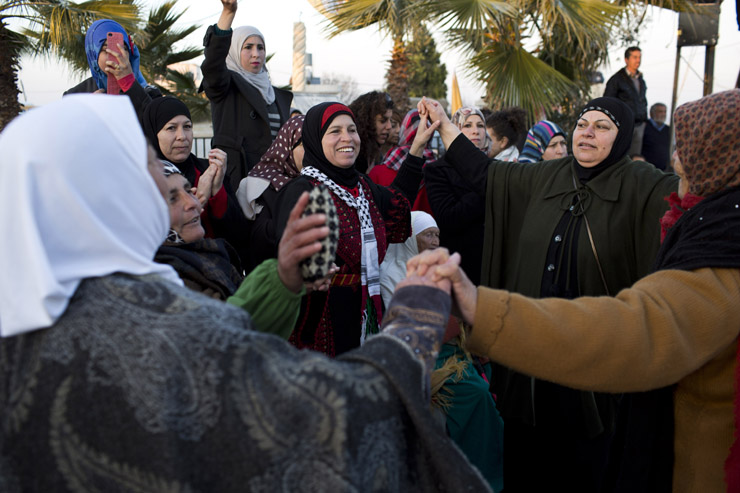Nabi Saleh Breaks The Military Siege
Apr 21 2014 / 12:36 am
By Carlos Latuff.
IMEMC – For three days, a small village in the West Bank, Nabi Saleh, was subjected to a military siege imposed by the Israeli army as a form of collective punishment.
On Saturday, the 12th of April, Israeli forces imposed a blockade on the village after declaring it a ‘closed military area’. All the main entrances were closed and anyone who attempted to enter or leave the village was attacked, regardless of any threat they may or may have not represented.
Just before the siege, Sarak, the military unit now in service and known for its ruthlessness, announced its plan to “impose law and order by suppressing any form of terrorism”.
A senseless statement, considering that Nabi Saleh since 2009, has been carrying out nonviolent actions against the Israeli occupation, in all its facets.
A strategic choice that has encouraged support for the Palestinian cause, the non-violent movement has collected numerous victories.
The oppressors — given the over-reaction and excessive brutality carried out against the residents, now — obviously perceive this as a threat.
In fact, a young man, Odai Tamimi, was shot in the face and in the chest by live ammunition. Wijdan Tamimi, a 45-year-old woman, was beaten and detained by the soldiers in front of her 4-year-old nephew. Faysal Nakhla was physically attacked and was prevented from reaching his house, at just 5 meters from the village’s entrance.
It appears clear that the siege was forced on the village as collective punishment, in the attempt to break the firmness of the popular struggle and weaken the whole nonviolent movement. In fact, Nabi Saleh is well known as one of the most actively resistant villages of the West Bank.
Every Friday, the village stages nonviolent demonstrations against the land confiscation and the theft of the town’s only water spring, carried out by the Halamish settlement. In the last month, Nabi Saleh endured an escalation of repression and arrests culminating in the blockade.
Once again, the adverse conditions didn’t break the willingness of the residents to react. On Monday, the 14th of April, the Popular Struggle Committee of Nabi Saleh called for a demonstration in order to end the siege.
Activists from all over the West Bank reached the village to give significant support to the action. Many mobile checkpoints were set up on the way from Ramallah, in the attempt to diminish the flow of protesters.
Even so, they didn’t manage to impact the effectiveness of the event, which ended up being a massive success.
As soon as the march reached the main road, the Israeli army started shooting intense amounts of tear gas and sound grenades.
Nevertheless, the march proceeded in a united way towards the checkpoint, where the participants refused to move until the soldiers agreed to open the gate and end the siege.
Despite the peaceful spirit of the demonstration, the army used uncontrolled violence, especially towards the women who were beaten, pushed and tossed to the ground several times.
After an hour or so, the army decided to withdraw and the demonstrators managed to open the main road’s gate, as well as the Eastern gate that was kept closed for 12 years.
Nabi Saleh has proven that the use of nonviolence isn’t a passive way to pursue the struggle, but that it’s a strategic choice which threatens the status-quo, allowing the participants to push their demands, and to obtain them.
This episode was also an occasion to remind the world that Palestinians are continuously subjected to travel restrictions and controls, due to the policy of territorial fragmentation carried out by the Israeli state, in order to prevent the establishment of a Palestinian state.
Such limitations manifest themselves through a system of checkpoints, settler-only apartheid roads and the infamous Apartheid Wall.

